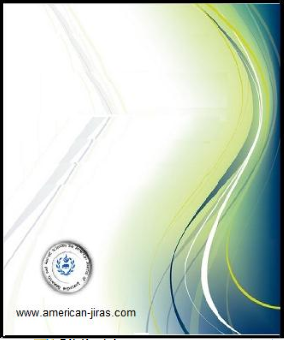
GENERAL INFORMATION

| ISSN: 2429-5396 (e) | www.american-jiras.com | |
| Web Site Form: v 0.1.05 | JF 22 Cours, Wellington le Clairval, Lillebonne | France |
| Web Site Form: v 0.1.05 | JF 22 Cours, Wellington le Clairval, Lillebonne | France |

ResearchBib, Google Scholar, SIS database, i.f.s.i.j, Scribd, IISJ, Eurasian Scientific Journal Index (ESJI), Indianscience.in, arastirmax, Directory of Research Journals Indexing, Pak Academic Sesearch, AcademicKeays, CiteSeerX, UDL Library, CAS Abstracts, J-Gate, WorldCat, Scirus, IET Inspec Direct, and getCited
Indexed by:
| HOME | ABOUT US | ARCHIVE | AIMS AND SCOP | AUTHORS | REVIEW | SUMIBMIT MANUSCRIPT | EDITORIAL BOARED | PUBLICATION FEE |
| | ARTICLES | Am. J. innov. res. appl. sci. Volume 9, Issue 2, Pages 174-184 (August 2019) |
| Research Article 4 |
ABSTRACT
Background: Nowadays, a number of entertainment satellite channels were proliferating across most of the Arab world. The emergence of satellite television broadcasting and other new media in the Middle East will profoundly change the political and social realities of the region. This reduces the importance of confidence in Middle East societies, and that confidence means more traditional media control and dependence placed on oral and unofficial means of communications. Objectives: The purpose of this study was to investigate the impact of satellite channels on the human behavior among Higher School Students in Wad Medani City, Gezira State, Sudan. The study conducted in the academic year 2016. Methods: A Systematic random sample of (102) male and female of higher school students was used. The students were asked to express their attitudes towards the impact of satellite channels on human behavior. A questionnaire was used for collecting data. The data analyzed with SPSS personal computer program. Appropriate statistics for description (frequencies, percentage, means, standard deviations, T-Test and One way ANOVA Test) were used. Results: The results showed that the calculated (Cal) t value > value derived from the statistical table (Tab); & the calculated (Cal) f value > f value derived from the statistical table (Tab). Conclusion: We concluded that the study participants have positive attitudes towards the impact of satellite channels on behavior. There are significant differences between male and female attitudes in favor of males. There are significant differences related to the classroom and the age variables.
Keywords: SCP, Higher school students, Wad Medani City, Gezira state, Sudanese satellite Channels, Arab satellite Channels.
Background: Nowadays, a number of entertainment satellite channels were proliferating across most of the Arab world. The emergence of satellite television broadcasting and other new media in the Middle East will profoundly change the political and social realities of the region. This reduces the importance of confidence in Middle East societies, and that confidence means more traditional media control and dependence placed on oral and unofficial means of communications. Objectives: The purpose of this study was to investigate the impact of satellite channels on the human behavior among Higher School Students in Wad Medani City, Gezira State, Sudan. The study conducted in the academic year 2016. Methods: A Systematic random sample of (102) male and female of higher school students was used. The students were asked to express their attitudes towards the impact of satellite channels on human behavior. A questionnaire was used for collecting data. The data analyzed with SPSS personal computer program. Appropriate statistics for description (frequencies, percentage, means, standard deviations, T-Test and One way ANOVA Test) were used. Results: The results showed that the calculated (Cal) t value > value derived from the statistical table (Tab); & the calculated (Cal) f value > f value derived from the statistical table (Tab). Conclusion: We concluded that the study participants have positive attitudes towards the impact of satellite channels on behavior. There are significant differences between male and female attitudes in favor of males. There are significant differences related to the classroom and the age variables.
Keywords: SCP, Higher school students, Wad Medani City, Gezira state, Sudanese satellite Channels, Arab satellite Channels.


|
American Journal of innovative
Research & Applied Sciences
Research & Applied Sciences
ISSN 2429-5396 (Online)
OCLC Number: 920041286
OCLC Number: 920041286
| HOME || ABOUT US || ARCHIVES || AIMS AND SCOP || AUTHORS || REVIEW|| SUBMIT MANUSCRIPT || EDITORIAL BOARD || CONTACT US |

| AUGUST | VOLUME 9 | N° 2 | 2019 |
Authors Contact
*Correspondant author and authors Copyright © 2019:
| Mahasin Gad Alla Mohamed 1,2* |
Affiliation.
1 Jazan University | Educational Technology | Jazan | Kingdom Saudi Arabia |
2. Faculty of Education-Sabya | Jazan University | Kingdom Saudi Arabia |
This article is made freely available as part of this journal's Open Access: ID | Mahasin-Ref.1-ajira280719 |

| Info-AJIRAS-® Journal ISSN 2429-5396 (Online) / Reference CIF/15/0289M |
American Journal of Innovative Research & Applied Sciences
| Mahasin Gad Alla Mohamed 1,2* |. Am. J. innov. res. appl. sci. 2019; 9(2):174-184.
| PDF FULL TEXT | | XML FILE | | Received | 28 June 2019 | | Accepted | 01 July 2019 | | Published | 06 August 2019 |